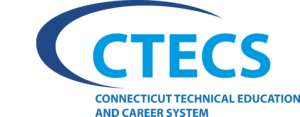The Social Studies Program
The Social Studies program prepares students to become informed, responsible, active citizens in their city/town, state, nation and world. Through a sequence of courses in Grades 9 -12, students deepen their understanding of civics, economics, geography, history, and other social sciences.
Students use inquiry and discussion to learn about domestic and global issues. They learn multiple perspectives about diverse cultures around the world.
Students read, write, collaborate, and research to think like historians and form positions using various sources.
Students have the opportunity to take honors-level and college-level courses.
For more information about our programs please view CTECS Program of Studies.
Social Studies Sequence
(3 credits required for graduation including 1 credit in Civics/American Government. A U.S. History course must be included in a student’s course sequence.)
| Grade 9 | Grade 10 | Grade 11 | Grade 12 |
|---|---|---|---|
| 1 credit | 1 credit | 1 credit | 1 credit Electives |
| World History
Honors World History |
Civics/American Government
Honors Civics/American Government* |
Modern U. S. History
Honors Modern U. S. History U.S. History-UCONN American Studies-UCONN |
American Studies-UCONN
AP Human Geography Contemporary Issues Economics Economics and Law Economics-UCONN Holocaust, Genocide and Human Rights Intro. To Human Rights-UCONN Honors Contemporary Issues Honors Economics Honors Economics and Law Psychology Social Studies Topics Sociology Topics in Modern U.S. History U.S. History -UCONN |
½ credit Electives available at some school locations.
Social Studies Course Descriptions
Grade 9
Grade 10
Grade 11/12
Honors/Advanced Placement Courses
The course materials in a social studies honors/advanced placement course are more rigorous in the following areas: text selection; length of reading assignments; writing assignment prompts; assessment types. The term “advanced” as used in this description includes UCONN Early Experience courses, Community College Career Pathways Courses and College Board AP Courses. There may be additional requirements for UCONN, community college and AP courses as requested by the credit granting institutions. Students in an honors/advanced placement course will be expected to do the following:
- Comprehend complex grade-level texts independently.
- Contribute thoughtful grade-level commentary to classroom discussion.
- Write to grade-level expectations with attention to organization, detailed content, precise analysis and writing conventions.
- Understand the fundamentals of the research process and execute research with minimal support from teacher.
- Create and conduct presentations for classmates and take a lead role in classroom discussions.
Students seeking admission into a social studies honors/advanced placement course should meet at least 2 of the 3 following criteria:
- Reading on Grade Level: Students seeking to take a social studies honors/advanced placement course should be reading on the same grade level as the course they are seeking entry into as demonstrated by the STAR Reading Diagnostic Test. (Example: Students seeking entry to American Civics Honors (10th), should be reading on a 10th grade reading level at the time of scheduling the course.)
- Current grade in social studies course:
- If student is currently in a social studies honors course, h/she should have an earned 85% or higher at the time of scheduling.
- If student is currently in a core level social studies course, h/she should have an earned 90% or higher at the time of scheduling.
- Teacher Recommendation: When recommending students, teachers should take into consideration the above bulleted items.
* Some courses may not be offered at every school.
